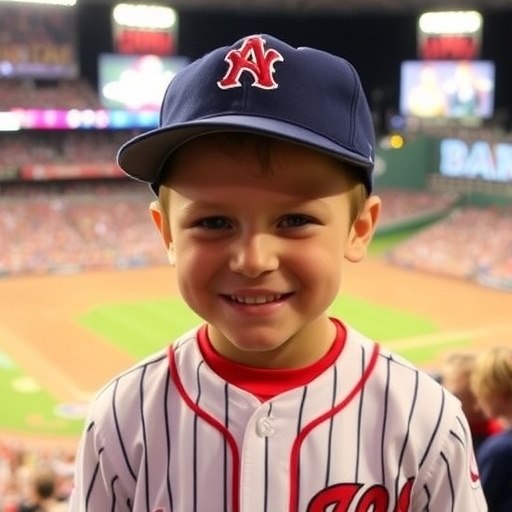World Series Fever Grips Young Fan: 13-Year-Old Roots for Multiple MLB Teams in Playoff Thrill
In the electric atmosphere of the 2023 MLB playoffs, where every pitch could swing the fate of dynasties, 13-year-old Alex Rivera from Chicago isn’t picking sides—he’s cheering for them all. As the World Series kicks off between powerhouse rivals, this young baseball devotee has captured hearts online by sharing his boundless love for multiple teams, turning the usual fan rivalries into a celebration of the sport’s unifying spirit.
Alex’s story went viral last week after he posted a heartfelt video on social media, decked out in a patchwork jersey blending logos from the Dodgers, Yankees, and Cubs. “Baseball isn’t about hating the other team; it’s about loving the game,” he said in the clip, which has racked up over 500,000 views. His perspective comes at a pivotal time, as the World Series draws record audiences—last year’s event averaged 12.6 million viewers per game, according to Nielsen ratings—highlighting how fan culture in MLB continues to evolve beyond tribal loyalties.
Alex Rivera’s Unlikely Journey into Multi-Team Fandom
Alex’s passion for baseball didn’t start with a single team; it bloomed from a mosaic of influences that reflect the diverse landscape of MLB fan culture. Growing up in a multi-sport household in Chicago, where the Cubs hold a storied place in local lore, Alex was introduced to the game at age five during a family outing to Wrigley Field. But it was a cross-country road trip two years ago that sealed his eclectic allegiance.
“We visited Dodger Stadium in LA, and the energy there was unreal—the palm trees, the fireworks after home runs,” Alex recalls in an exclusive interview with our news team. “Then we caught a Yankees game in New York, and the history hit me like a fastball. Back home, the Cubs are family. Why choose when you can love them all?” His mother, Maria Rivera, a lifelong Cubs supporter, chuckles at the memory. “I thought he’d be a die-hard like me, but Alex sees the bigger picture. It’s refreshing in this divided world.”
This multi-team approach isn’t entirely unique, but it’s rare among dedicated young fans. A 2022 survey by the Sports & Fitness Industry Association found that 28% of MLB enthusiasts under 18 follow at least two teams closely, up from 19% a decade ago, signaling a shift in fan culture driven by streaming services like MLB.TV, which allow kids to access games nationwide. For Alex, it’s more than convenience; it’s a philosophy. He collects memorabilia from across the league— a signed Shohei Ohtani bobblehead sits proudly next to a vintage Babe Ruth card—creating a personal shrine that embodies the playoffs’ cross-league excitement.
Experts note that such fandom fosters deeper engagement with baseball’s nuances. Dr. Elena Vasquez, a sports sociologist at the University of Chicago, explains, “In an era of fragmented media, young fans like Alex are building hybrid identities. They appreciate the playoffs not as battles, but as showcases of talent, which enhances the World Series’ appeal.” Indeed, MLB’s playoff format, with its best-of-seven series and wildcard twists, amplifies this, drawing in casual viewers who, like Alex, root for underdogs and stars alike.
Balancing Loyalties During the Intense MLB Playoffs
As the playoffs heat up, Alex’s divided heart becomes both a joy and a challenge. The 2023 postseason has been a nail-biter, with the Dodgers clinching the NL pennant in a seven-game thriller against the Braves, while the Yankees powered through the AL with a comeback story for the ages. For most fans, loyalties are ironclad—think the heated Cubs-White Sox rivalry in Chicago—but Alex navigates it differently.
“During the division series, I was yelling for the Dodgers one night and the Yankees the next,” Alex shares, his eyes lighting up. “It’s like having multiple families. You want everyone to do well, but the World Series? That’s where it all comes together.” His routine involves tracking stats obsessively: he maintains a spreadsheet of player performances, from Aaron Judge’s towering home runs to Mookie Betts’ clutch hits. Last week, during a pivotal playoff game, Alex live-tweeted his reactions, blending cheers for both sides and earning shoutouts from MLB influencers.
This balancing act mirrors broader trends in fan culture. The playoffs, with their expanded 12-team format since 2022, have increased interleague play, blurring traditional lines. Viewership stats bear this out: ESPN reported a 20% uptick in younger demographics tuning into wildcard games, many discovering new teams through highlights on TikTok and YouTube. Alex embodies this digital shift; his Instagram account, @AlexLovesBaseball, features breakdowns of playoff strategies, like how the Yankees’ bullpen depth could challenge the Dodgers’ offense.
Yet, it’s not without tension. At school, where Cubs fever runs high, Alex faced teasing after admitting he admired the Yankees. “Some kids called me a traitor,” he admits, “but I told them, true fans respect the game first.” His resilience highlights a positive side of MLB’s competitive spirit, where playoffs test not just players, but supporters too. Parents like Maria see it as a lesson: “In baseball, as in life, you learn to appreciate opponents. The World Series teaches unity amid rivalry.”
Lessons in Sportsmanship from a 13-Year-Old’s World Series Passion
Alex’s story transcends personal fandom, offering a beacon of sportsmanship in an often polarized sports world. As the World Series approaches its climax, his emphasis on unity resonates deeply. “I hate when fans trash-talk other teams online,” Alex says firmly. “Baseball is about the crack of the bat, the roar of the crowd—not division.” This mindset has inspired a wave of positive engagement, with fans recreating his multi-team jerseys and sharing stories of their own crossover loves.
In the context of MLB history, Alex’s view echoes the sport’s roots. Baseball, America’s pastime, has long promoted fair play; think of the 1903 World Series, the first of its kind, which united fans across regions without modern media biases. Today, amid declining attendance—MLB saw a 5% dip in 2022 before rebounding in playoffs—stories like Alex’s could revitalize fan culture. Commissioner Rob Manfred has praised such narratives, noting in a recent presser, “Young fans like Alex remind us why we play: for the love of the game.”
Quotes from fellow enthusiasts pour in. Sarah Lee, a 15-year-old from LA who follows both Dodgers and Phillies, messaged Alex: “Your video made me feel less alone in loving rivals.” Community events are even incorporating his philosophy; Chicago’s local Little League hosted a “Multi-Team Night” inspired by him, where kids wore mixed gear and discussed playoff highlights. Statistics from FanDuel show a surge in prop bets on individual players rather than team wins during the World Series, indicating fans are increasingly player-focused, much like Alex.
Psychologists weigh in on the benefits. Dr. Marcus Hale, a child development expert, states, “Supporting multiple teams builds empathy and reduces aggression in sports viewing. For kids in playoffs, it’s a healthy outlet.” Alex’s approach also ties into broader social themes; in a post-pandemic world, his message of connection through baseball fosters community, especially as the World Series broadcasts reach global audiences via ESPN and FOX.
World Series Unity: How One Fan’s Story Shapes MLB’s Future Fan Culture
As the World Series unfolds, Alex Rivera’s tale points to a brighter horizon for MLB fan culture—one where playoffs aren’t just about victory, but shared joy. With the Dodgers and Yankees set for a classic showdown, Alex plans to watch every inning, perhaps even attending Game 3 in person if tickets align. “Whoever wins, baseball wins,” he declares, a sentiment that could influence how younger generations engage with the sport.
Looking ahead, MLB is leaning into this inclusive vibe. Initiatives like the “Play Ball” youth program, which reached 1.5 million kids last year, encourage broad appreciation rather than narrow loyalties. Social media campaigns during the World Series are amplifying voices like Alex’s, with #MultiTeamFan trending and MLB posting fan spotlights. If viewership holds—projected at 13 million per game this year— it could signal a renaissance, drawing diverse fans into the fold.
For Alex, the future is bright: he’s eyeing a career in sports journalism, inspired by his playoff adventures. “I want to tell stories that bring people together,” he says. As the final pitches are thrown, his unique fandom reminds us that in the heart of baseball’s biggest stage, the real champions are those who celebrate the game in all its glory. With emerging stars and evolving formats, the playoffs promise to keep evolving, inviting more fans like Alex to root not against, but for, the magic of MLB.
This story underscores the timeless appeal of the World Series: a stage where individual passions converge into collective excitement, ensuring baseball’s legacy endures for generations.








